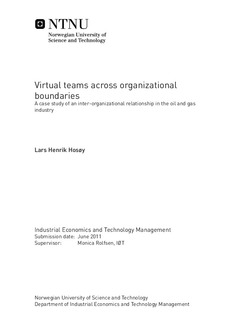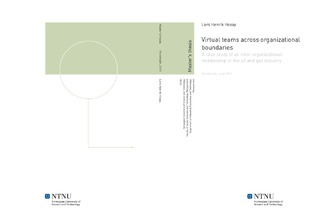| dc.description.abstract | Over the last years, rapid technological development has made it possible for organizations to increase their use of virtual teams. Unlike traditional face-to-face teams, virtual teams enable people to collaborate across virtual dimensions like geographical dispersion, time and cultural diversity. By making use of virtual teams, organizations are able to increase the efficiency and performance, as they can be more flexible than traditional face-to-face teams. There has been an increased focus on research within this field of work in line with the development of virtual teams. However, there are few studies that have investigated the affect virtual teams as a work process has on collaborative relationships across organizational boundaries. This Master thesis is analyzing how inter-organizational relationships in the oil and gas industry can be affected by implementing Integrated Operations (IO) to their work processes. IO is a strategic tool using information and communication technology in order to change work practices and enabling people and organizations within this industry to work together through virtual communication channels. Organizations use virtual teams by installing collaboration rooms equipped with video walls and sound. In these rooms, people can communicate in real-time and across large geographical distances. This can potentially increase the effectiveness and simplifies collaboration both offshore and onshore. This study describes new challenges and opportunities in inter-organizational relationships between operator companies and suppliers due to the implementation of IO, and how working in virtual teams influences the relationships. In order to explore these issues, a case study of a business relationship between two companies in the oil and gas industry has been conducted, where collaboration takes place across geographical distance and across organizational boundaries. These companies are using virtual teams as a basis for their collaborative work. Their interaction through virtual communication channels has been observed over a significant period of time, and semi-structured interviews have been used to support the findings from the observations. This is done in order to analyze the potential and challenges of implementing IO in this industry.The main findings in this study show that there is a great potential for using virtual teams when interacting across organizational boundaries. Operator companies and suppliers have the opportunity of developing closer relations by working in virtual teams as such teams simplify the processes of communicating. However, there are some significant challenges. Virtual teams are most successful when the actors collaborating have a personal relationship. This if most often the case when actors within the same organization are working together. People that are collaborating through inter-organizational relationship may have less knowledge of each other. Relationships where the organizations have an unequal power structure due to their size and influence in the oil and gas industry can be especially challenging. As the actors are trying to protect their own organization s interest, an unequal power structure can question the level of trust and potential for value creation within the team. This can potentially create boundaries and limitations when communicating through virtual communication channels as interaction through videoconference systems creates a less personal environment than traditional face-to-face communication. The main contribution of this study is that: taking use of virtual dimension in inter-organizational relationships increases the potential level of conflicts between organizations, complicates the communication process and consolidates the power structure in the relationship between the collaborating parties. | nb_NO |

